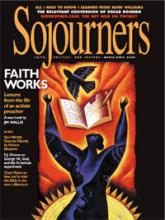I am continually amazed at how easily we think we can know another human being from a glance, a conversation, or even months of friendship. The willingness to see another human being and to be seen, to stay open to the unknown in the process, is a supreme act of faith. It is a triumphant declaration of what matters, and it transforms us, both individually and collectively.
This willingness to see and be seen is not easy work, but I believe that our survival depends on our ability to build a collective story across lines of difference. This requires a rare kind of openness, an ability to receive without judgment or preconception how other persons define themselves.
Last December I attended the Parliament of the Worlds Religions in Cape Town, South Africa, with hopes of gaining more insight into how a new story of love and justice could be created on a global scale. With 3,500 people gathering from all over the world, I was eager to engage in ways that would truly deepen my own understanding and dissolve some of the barriers to durable bonds forged of both reality and vision.
I have seen how this works on a smaller scale.
Through stone circles, the small nonprofit organization I run in Durham, North Carolina, I have been creating spaces for interfaith dialogue and the creative integration of spiritual practice and social justice for the past four years. Above all, this requires formats that allow us to break through our isolation and truly engage with people across lines of difference. We have explored innovative ways to get folks to sit down, pause a moment, remember their own truth, then talk to each other.
Read the Full Article
